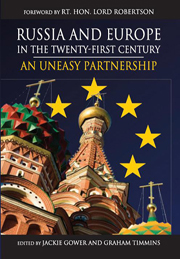Book contents
- Frontmatter
- Contents
- List of Contributors
- Acknowledgements
- List of Abbreviations/Acronyms
- Foreword Russia and Europe
- Preface
- Introduction Russia and Europe: What Kind of Partnership?
- PART 1 Russia looking West
- PART 2 Europe looking East
- PART 3 Partnership in Practice
- Conclusion Russia and Europe: An Uneasy Partnership 289
- Index
- More Titles in this series
Introduction Russia and Europe: What Kind of Partnership?
Published online by Cambridge University Press: 05 March 2012
- Frontmatter
- Contents
- List of Contributors
- Acknowledgements
- List of Abbreviations/Acronyms
- Foreword Russia and Europe
- Preface
- Introduction Russia and Europe: What Kind of Partnership?
- PART 1 Russia looking West
- PART 2 Europe looking East
- PART 3 Partnership in Practice
- Conclusion Russia and Europe: An Uneasy Partnership 289
- Index
- More Titles in this series
Summary
Russia and Europe in the Post-Cold War World
At the opening of the twenty-first century there was widespread optimism that the relationship between Russia and Europe was entering a new era of unprecedented cooperation and constructive engagement. Growing economic interdependence and the recognition of shared political, security and environmental challenges provided a powerful rationale for the development of a genuinely strategic partnership. However, by the summer of 2006 when this research project was completed it was clear that there was deep disappointment on both sides that so little had actually been achieved either in terms of practical outcomes or in developing mutual understanding and trust. As is usually the case when relationships are strained, the reasons are complex and rooted in the legacy of the past as much as in the difficulties of the present.
The sudden implosion of the Soviet-type system in central and eastern Europe (CEE) in 1989 and, ultimately, the Soviet Union two years later in 1991, initiated a traumatic period of socio-economic and political disruption and decline in Russia during the 1990s which was to culminate in the collapse of the rouble in August 1998 and the political humiliation of its impotence in the face of the North Atlantic Treaty Organization (NATO)-led military intervention into Kosovo in 1999. During this decade there was a fundamental transformation of the European political landscape which introduced a situation of extreme uncertainty within the international community.
- Type
- Chapter
- Information
- Russia and Europe in the Twenty-First CenturyAn Uneasy Partnership, pp. xxi - xxviPublisher: Anthem PressPrint publication year: 2007

